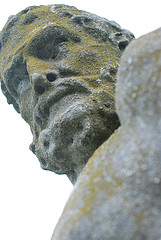That would be ZEUS, who defeated Typhon by throwing Mount Etna on him.
In the ancient Greek religion, Zeus is the "Father of Gods and men" who rules the Olympians of Mount Olympus as a father rules the family. He is known as the god of the sky and of thunder in Greek mythology. In Roman mythology, his counterpart is Jupiter. For the Greeks, he was the King of the Gods, who oversaw the universe.
Zeus is known for his highly erotic escapades which in turn resulted in many godly and heroic offspring, including Athena, Apollo and Artemis, Hermes, Persephone (by Demeter), Dionysus, Perseus, Heracles, Helen of Troy, Minos, and the Muses (by Mnemosyne); by Hera, he is usually said to have fathered Ares, Hebe and Hephaestus.
Symbology surrounding Zeus includes oak, the thunderbolt, bull, eagle, and the scepter. He is often depicted by Greek artists in one of two poses: Standing, striding forward, with a thunderbolt leveled in his raised right hand, or seated in majesty.
The story involving the throwing of Sicily's highest mountain on to a mythological monster runs as follows:
"After reaching manhood, Zeus forced Cronus to disgorge first the stone (which was set down at Pytho under the glens of Parnassus to be a sign to mortal men, the Omphalos) then his siblings in reverse order of swallowing. In some versions, Metis gave Cronus an emetic to force him to disgorge the babies, or Zeus cut Cronus' stomach open. Then Zeus released the brothers of Cronus, the Gigantes, the Hecatonchires and the Cyclopes, from their dungeon in Tartarus, killing their guard, Campe.
As a token of their appreciation, the Cyclopes gave him thunder and the thunderbolt, or lightning, which had previously been hidden by Gaia. Together, Zeus and his brothers and sisters, along with the Gigantes, Hecatonchires and Cyclopes overthrew Cronus and the other Titans, in the combat called the Titanomachy. The defeated Titans were then cast into a shadowy underworld region known as Tartarus. Atlas, one of the titans that fought against Zeus, was punished by having to hold up the sky.
After the battle with the Titans, Zeus shared the world with his elder brothers, Poseidon and Hades, by drawing lots: Zeus got the sky and air, Poseidon the waters, and Hades the world of the dead (the underworld). The ancient Earth, Gaia, could not be claimed; she was left to all three, each according to their capabilities, which explains why Poseidon was the "earth-shaker" (the god of earthquakes) and Hades claimed the humans that died (see also Penthus).
Gaia resented the way Zeus had treated the Titans, because they were her children. Soon after taking the throne as king of the gods, Zeus had to fight some of Gaia's other children, the monsters Typhon and Echidna. He vanquished Typhon and trapped him under Mount Etna, but left Echidna and her children alive."
In the ancient Greek religion, Zeus is the "Father of Gods and men" who rules the Olympians of Mount Olympus as a father rules the family. He is known as the god of the sky and of thunder in Greek mythology. In Roman mythology, his counterpart is Jupiter. For the Greeks, he was the King of the Gods, who oversaw the universe.
Zeus is known for his highly erotic escapades which in turn resulted in many godly and heroic offspring, including Athena, Apollo and Artemis, Hermes, Persephone (by Demeter), Dionysus, Perseus, Heracles, Helen of Troy, Minos, and the Muses (by Mnemosyne); by Hera, he is usually said to have fathered Ares, Hebe and Hephaestus.
Symbology surrounding Zeus includes oak, the thunderbolt, bull, eagle, and the scepter. He is often depicted by Greek artists in one of two poses: Standing, striding forward, with a thunderbolt leveled in his raised right hand, or seated in majesty.
The story involving the throwing of Sicily's highest mountain on to a mythological monster runs as follows:
"After reaching manhood, Zeus forced Cronus to disgorge first the stone (which was set down at Pytho under the glens of Parnassus to be a sign to mortal men, the Omphalos) then his siblings in reverse order of swallowing. In some versions, Metis gave Cronus an emetic to force him to disgorge the babies, or Zeus cut Cronus' stomach open. Then Zeus released the brothers of Cronus, the Gigantes, the Hecatonchires and the Cyclopes, from their dungeon in Tartarus, killing their guard, Campe.
As a token of their appreciation, the Cyclopes gave him thunder and the thunderbolt, or lightning, which had previously been hidden by Gaia. Together, Zeus and his brothers and sisters, along with the Gigantes, Hecatonchires and Cyclopes overthrew Cronus and the other Titans, in the combat called the Titanomachy. The defeated Titans were then cast into a shadowy underworld region known as Tartarus. Atlas, one of the titans that fought against Zeus, was punished by having to hold up the sky.
After the battle with the Titans, Zeus shared the world with his elder brothers, Poseidon and Hades, by drawing lots: Zeus got the sky and air, Poseidon the waters, and Hades the world of the dead (the underworld). The ancient Earth, Gaia, could not be claimed; she was left to all three, each according to their capabilities, which explains why Poseidon was the "earth-shaker" (the god of earthquakes) and Hades claimed the humans that died (see also Penthus).
Gaia resented the way Zeus had treated the Titans, because they were her children. Soon after taking the throne as king of the gods, Zeus had to fight some of Gaia's other children, the monsters Typhon and Echidna. He vanquished Typhon and trapped him under Mount Etna, but left Echidna and her children alive."

